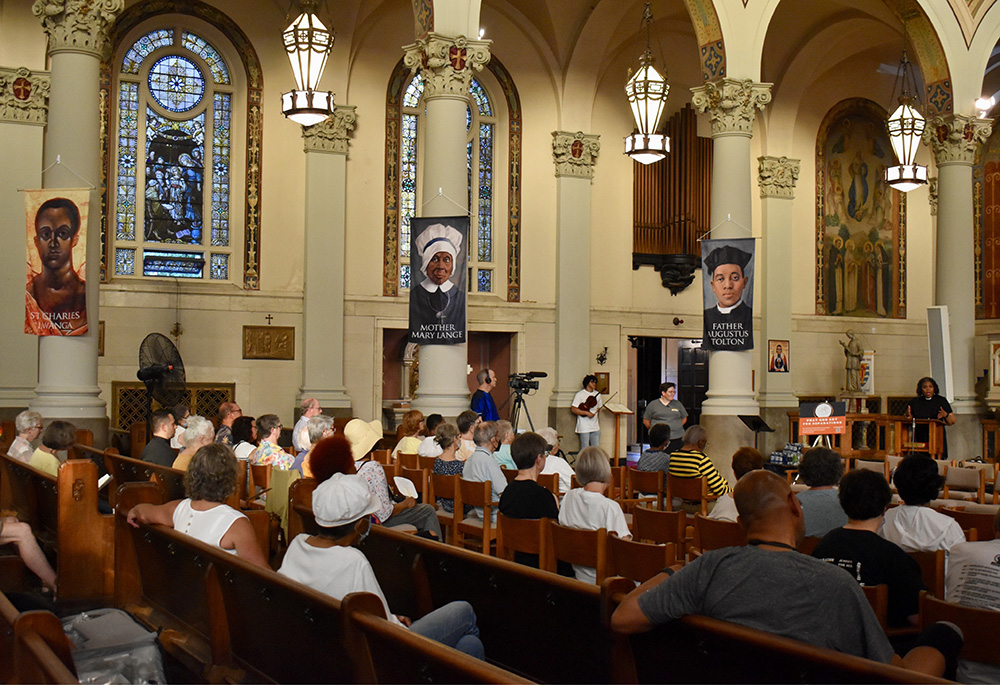
Network Lobby and the Cleveland Network Advocates Team host "Repair and Redress: A Vigil for Reparations" at St. Aloysius-St. Agatha Parish June 15 in Cleveland's Glenville neighborhood. (Network Lobby/Catherine Gillette)
On June 15, Network Lobby and the Cleveland Network Advocates Team hosted "Repair and Redress: A Vigil for Reparations" at St. Aloysius-St. Agatha Parish in Cleveland's Glenville neighborhood. We gathered as a community to listen, learn, pray and act as we called on President Biden to establish an H.R. 40-style federal commission to study reparations.
We were honored to welcome the Rev. Traci Blackmon, the associate general minister of justice and local church ministries for The United Church of Christ and senior pastor of Christ The King United Church of Christ in Florissant, Missouri. She began the vigil with a powerful oration.
Reparations, Rev. Blackmon said, are about "the church and the people and the society moving from charity to justice; moving from handouts to hand-ups; and moving from offering to give someone a fish to giving them a lake so they can fish for themselves."
So, what exactly are reparations? Many historians refer to Gen. William Sherman's promise of "40 acres and a mule" in 1865 as the first example of reparations to formerly enslaved peoples. However, this promise was short-lived because the offer was rescinded after President Lincoln's assassination. Still, 157 years after General Sherman's promise, the United States as a society has yet to address reparations. The time is now.
Beginning in 1989, the late Rep. John Conyers, D-Mich., first introduced H.R. 40, a piece of legislation to establish a commission to study reparations. This year, Rep. Sheila Jackson Lee, D-Texas, who introduced H.R. 40 in 2021, said, "Reparations is about repair and when you repair the damage that has been done, you do so much to move a society forward. This commission can be a healing process. Telling the truth can heal America."
Telling the truth and sharing sacred stories is, indeed, the only way we can begin to repair and redress the pain caused by slavery, and our country's inability to truly repent for centuries of systemic racism. At times it can feel so overwhelming — where do we begin? As we learned in Cleveland and from Rev. Blackmon, the place to begin is in the church — in our communities.
Advertisement
As part of the ritual, we listened to five truth-tellers share their sacred stories. As the last speaker began, he said, "Driving here, I did not know if I was going to speak, but my ancestors have stories that need to be told … and being here with my church family is the place to tell those stories." We listened to stories of discrimination, of different realities in the North and South, of disappeared family members. We heard stories of courage, of pride, and of a deep abiding faith.
His words were a stark reminder that our church — or our own faith and/or religious communities — is the place to have these conversations. If it is the church — the place that is responsible for centuries of racism and slavery — it is also the place for healing … the place where we repair and redress the ongoing repercussions of chattel slavery and continued systemic racism.
After listening to our fellow Clevelanders, we asked for forgiveness for the times that we have not stopped systemic racism or discrimination, for the times we have unconsciously contributed to the "othering" of another individual, and for the times we have not loved our neighbor as ourself and promised to uphold our commitment to peace and justice.
Personally, I was reminded that reparations begin with relationships and building community. As Rev. Blackmon said, reparations are not charity or a handout. If we view reparations as charity, then we continue to perpetuate the racist trope of inequality. We need to hear each other's stories. We need to know who is in community with us. We need to know our neighbors.
How do we begin? As religious in the United States, we can look to the work of the Society of the Sacred Heart who, in 2018, began the work of reparations and justice, and to the Jesuits. Cities like Evanston, Illinois, voted to pay $400,000 in reparations to eligible Black residents. Does your church or religious community engage in conversation about reparation? Has your city begun to discuss reparations for its residents?
I would encourage all of you who read this article to do three things:
- First, watch Network Lobby's H.R. 40 Webinar to learn more about reparations and the call for President Biden to establish a commission;
- Second, call and email the White House here demanding that President Biden establish the H.R. 40-style federal commission to study reparations;
- Third, share this article and information with a friend. Begin an honest conversation with people you know about slavery and systemic racism. We know that these are hard conversations for so many to engage in because it requires many of us to reflect deeply about our own (white) privilege and painful history about organizations and communities to which we have dedicated our lives.
Our voices are stronger together and we need to pray and act for reparations. The time is now.







